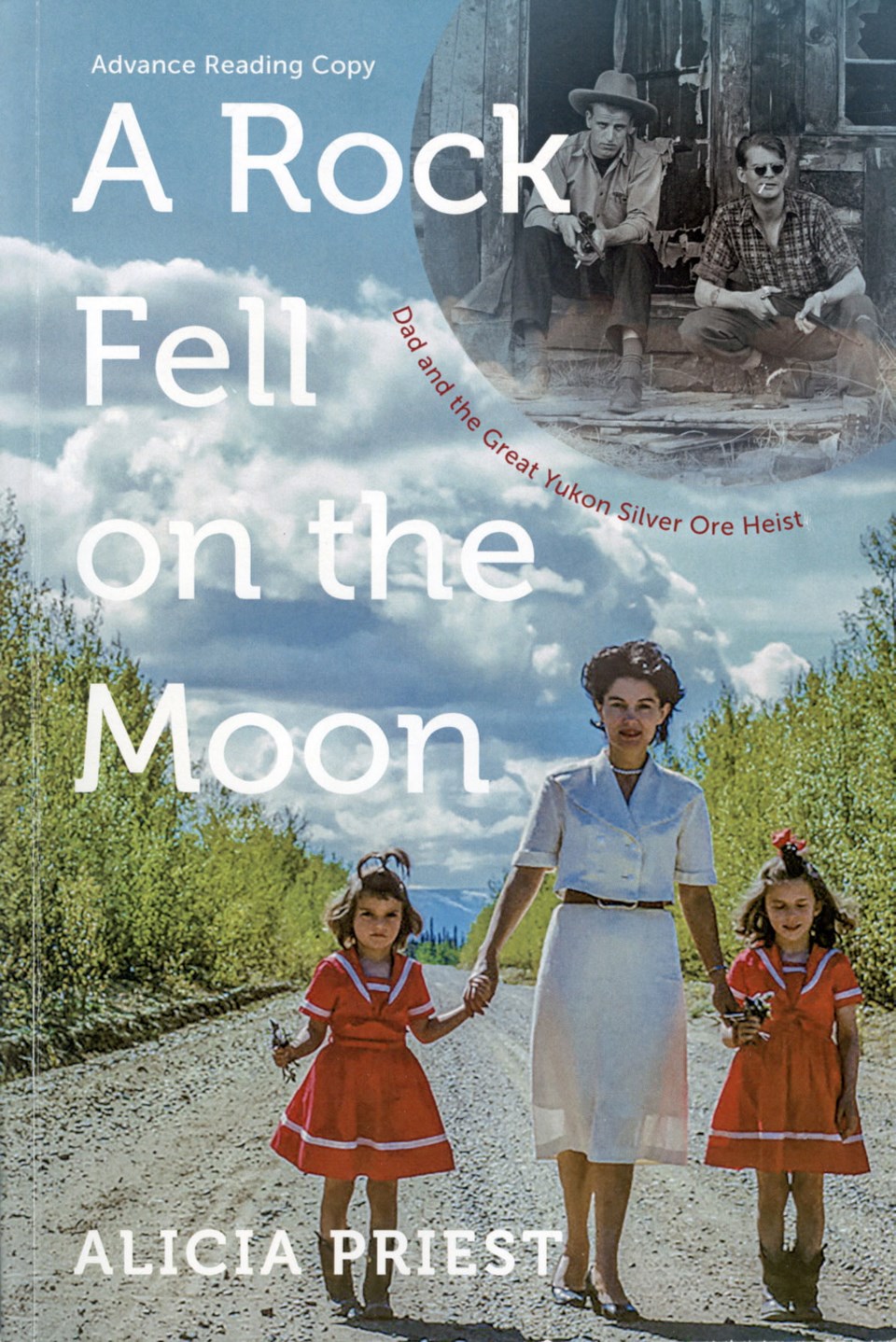Victoria journalist Alicia Priest always believed her family’s story would make a good book. But it took a death sentence for Priest to put words to page.
Priest began researching her family’s story in 2011. But the now 61-year-old woman didn’t start writing until the following year. That’s when she was handed, in her words, “the ultimate deadline.” It was a diagnosis of ALS, amyotrophic lateral sclerosis, also known as Lou Gehrig’s disease.
ALS is a fatal neurodegenerative disease in which all muscles in the body gradually weaken and cease to function. Death typically occurs about three to five years from the onset.
So Priest, with the assistance of her husband, Ben Parfitt, another noted B.C. journalist, researched, wrote, edited and finished A Rock Fell on the Moon.
It’s a story based on her father, Gerald Henry Priest (1927-2006) who, in 1966, was convicted of stealing close to two tonnes of ore from the Yukon silver mine where he worked, a theft that yielded about $160,000 worth of silver, about $2.3 million today.
But A Rock Fell on the Moon is not based solely on Gerald Priest’s theft and conviction. It’s really a story about a family smashed and wounded by the father’s deceit, dishonesty and his pathetic fear of the truth.
Even now, with the book completed and Alicia Priest unable to speak because of ALS, she is unwilling to allow her father off any moral hook.
“He lied to us,” Priest printed on a digital writing pad during an interview at her Oak Bay home.
The ALS has now forced some medical interventions upon her. Unable to swallow, she has a feeding tube implanted into her stomach. But Priest also made it plain she will not have a tracheotomy to implant a breathing tube. The prognosis for her time of death is “when I say so,” she printed on her digital pad.
With a writing career that spans the Globe and Mail, the Vancouver Sun and Georgia Straight, Priest also made it plain her book is about its own story. It’s not about her ALS, a topic she declared in the interview “too boring” for a general readership.
A Rock Fell on the Moon, however, is a fascinating glimpse into a Canadian way of life no longer seen.
Priest and her sister, Vona, spent their childhood in the Yukon in Elsa, one of those small, company mining towns that once dotted the Canadian North and much of B.C., but now have been either abandoned or become functioning municipalities.
Memories from childhood, recalled conversations with her mother and saved letters buttress the official story revealed in court files and newspaper clippings. It’s these human elements that offer emotional depth to what otherwise would be a dry story filled with testimony from geologists.
In the silver heist, Gerald Priest and two accomplices managed to truck out nearly two tonnes of silver-rich ore. They even had it smelted to extract the metal, riches they never received.
And they almost got away with it. They were caught only because of a casual glance by a suspicious and unpopular mine manager.
They were tried at the insistence of a mining company that could be benevolent on one hand, with good wages, good housing, good food, even subsidized cigarettes and beer, but vindictive and predatory when crossed.
And they were only convicted by a weird, guilty-until-proven-innocent Canadian law no longer in existence since the adoption of the Charter of Rights.
Throughout the caper and court machinations, Priest chronicles the explosion of her family. She and her sister went from Canadian-wilderness ideal, lots of snow, bush and a cosy, cabin home, to a mouldy basement suite in Vancouver.
Her father went from a self-styled mountain man, a lover of Robert Service, to a pathetic wretch.
Priest, however, is brutally honest at noting the hints of the flim-flammery always present in her father, something she missed as a little girl.
For example, a Texas tattoo on a man who had never been south of Seattle might be a giveaway for an adult. But for besotted daughters, it stirred fantasies of cowboys and lots and lots of horses.
Two human constants are reflected well in A Rock Fell on the Moon: Alicia’s mother, Helen, and grandmother, Maria, or “Omi.”
Both of them were Ukrainian Mennonite refugees from the Soviet Union. They escaped via Nazi Germany, which was crashing in defeat, and postwar resettlement programs. And Priest gives full credit to the love and inner strength of both women throughout the family crisis.
Priest said in the interview the one story she regrets not telling is her mother’s story.
If A Rock Fell on the Moon were fiction, Helen and Maria would be principals and provide the moral centre. The two women’s trek, through trial and darkness, does credit to Frodo and Sam in Tolkien’s Lord of the Rings.
A Rock Fell on the Moon is published by Harbour Publishing and scheduled for release on Tuesday.
